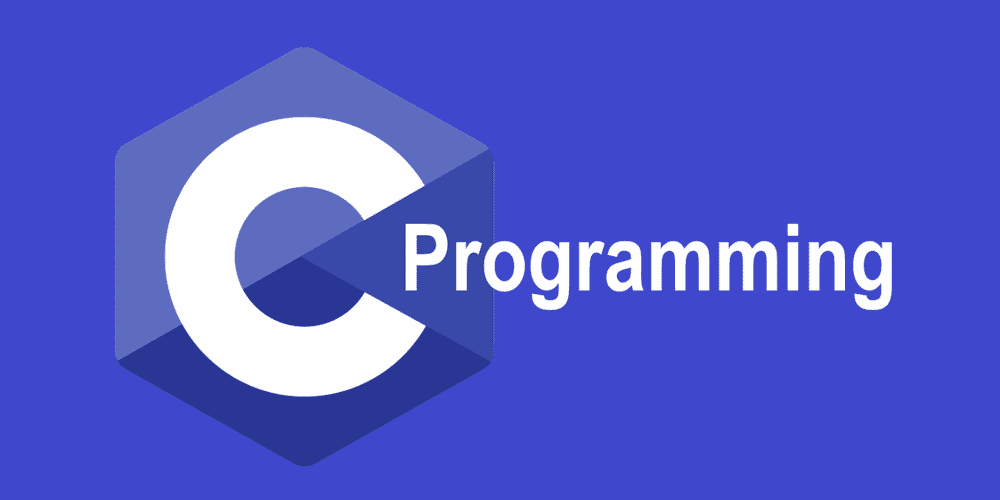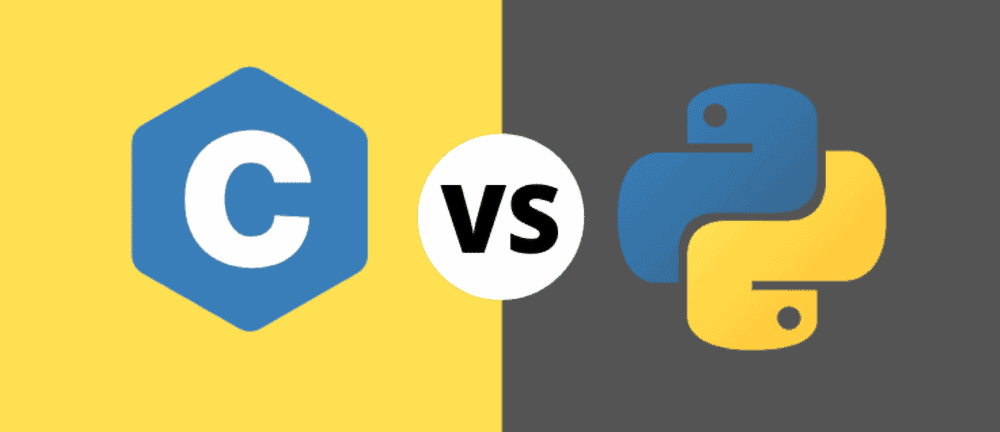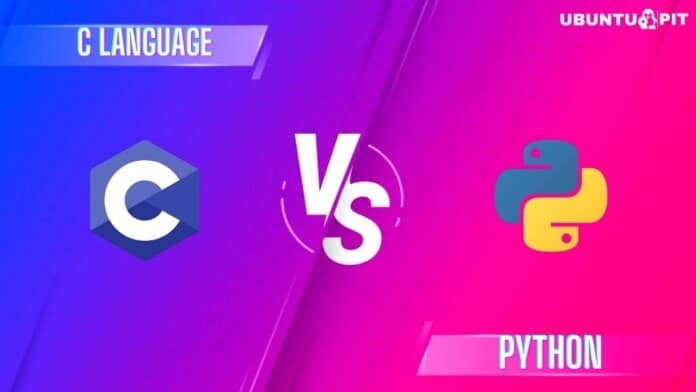One of the most common dilemmas that beginners face is choosing the programming language they should learn first. And even if you aren’t a beginner, you could be wondering which language to try next – so there’s a chance that you might look up the difference: C vs Python.
Why – you ask? Well, they are the easiest and two of the most useful programming languages to learn out there. Either can set fundamental concepts in your mind like concrete and make you career-ready with proper implementation in a short time. But there are many differences we must take note of before that. So, for now, keep reading!
C vs Python: The Fundamental Facts
 If you want to learn more about the difference between C and Python, we’ll be glad to help you explore. But first, we must introduce you to the basics of these languages without further delay. So, let’s dive right in.
If you want to learn more about the difference between C and Python, we’ll be glad to help you explore. But first, we must introduce you to the basics of these languages without further delay. So, let’s dive right in.
Highlights of C Programming Language
 C language is one of the oldest high-level programming languages to exist, developed by Dennis Ritchie for general purposes in 1972. It is a direct predecessor of the B language, which we hardly use in this era. However, you can rest assured that C won’t be going anywhere anytime soon.
C language is one of the oldest high-level programming languages to exist, developed by Dennis Ritchie for general purposes in 1972. It is a direct predecessor of the B language, which we hardly use in this era. However, you can rest assured that C won’t be going anywhere anytime soon.
That said, some even claim the C programming language to be a meeting ground between machine-level and high-level programming due to its versatile uses – but we will talk about those in later sections.
Advantages
- It is simple to write, easy to read and understand and debug.
- C is a library-rich language with robust uses in all IT development fields.
- Its portable nature allows users to work from anywhere at any given time.
- One can implement data structures and complex algorithms quickly without performance loss.
Disadvantages
- As a procedural language, C lacks OOP concepts. Hence, features such as abstraction and encapsulation are hard to achieve manually in C.
- The absence of the namespace feature does not allow users to assign identical variable names.
- It has a longer learning curve as beginners may find the concepts difficult to implement.
Highlights of Python Programming Language
 Python might seem on the opposite end of the spectrum when comparing C vs Python. It is a high-level object-oriented language that is super easy to implement and learn. In fact, you can learn the language without prior programming knowledge.
Python might seem on the opposite end of the spectrum when comparing C vs Python. It is a high-level object-oriented language that is super easy to implement and learn. In fact, you can learn the language without prior programming knowledge.
Python is a moderately new language compared to C, and it is a direct predecessor of the ABC programming language. It is a user favorite due to its easy syntax and is highly efficient in fields like data analysis and machine learning.
Advantages
- It is a typed language without the hassle of adding parenthesis and semicolons in its syntax.
- Python improves productivity as you do not have to focus much on syntax so that you can concentrate better on problem-solving.
- Debugging in Python is much easier due to its interpreted nature.
- The language also has a built-in garbage collection feature that makes memory management easier.
Disadvantages
- Although Python is high on the WORA claims, Python-built applications do not perform so well on the client side.
- It has a weak and primitive database access layer that makes it unsuitable for enterprise-level development.
- Even though Python’s interpreted nature makes debugging easier, it also makes Python-built applications slow.
C vs Python: 3 Reasons For The Comparison
By now, you must have gotten an idea of the difference between C and Python. But have you wondered what really makes us draw the comparison between C vs Python? Well, the similarities, of course. So, let’s take a look at them, shall we?
1. Beginner friendly
Both Python and C are super beginner friendly. Even though many may think C to be harder than Python, both are great choices for ingraining the fundamentals of programming in your brain. They are both also open source languages that make beginners favor them better as it’s free of cost, and their community contributions make them ever-evolving.
2. Extensible and can be Embedded
C and Python are also extensible languages even though they belong to different paradigms; both languages can be extended using third-party libraries or plugins. You can also embed Python within non-Python programs by importing python libraries in it, whereas C has a whole other plugin extension called Embedded C that makes C language embeddable.
3. Libraries and Standard Functions
Python and C are two highly robust languages with a large number of libraries and standard functions to choose from as extensions to the language. This allows users to implement the languages in various real-life projects, even outside the programming industry. A fun fact is that some Python standard functions are written in C.
C vs Python: 8 Key Things that Make Them Different
 Now that you know why the C vs Python comparison exists, we can get to the part we have been anticipating the most: their key differences. The reasoning behind such a discussion is to spread out the two languages like open books so that you can choose between the two with ease by the end of your read. Let’s keep moving.
Now that you know why the C vs Python comparison exists, we can get to the part we have been anticipating the most: their key differences. The reasoning behind such a discussion is to spread out the two languages like open books so that you can choose between the two with ease by the end of your read. Let’s keep moving.
1. Paradigms
The term “paradigm” refers to a set of ideas or a standard. That said, in programming, paradigms simply mean classifying languages through their unique functionalities. There are two main programming paradigms out there- imperative and logical. C Programming Language falls under the imperative paradigm, making it less intuitive compared to a multi-paradigm language like Python.
2. Language Type
C is a procedural or structured language, whereas Python is an object-oriented language. This means that C lacks object-oriented concepts such as inheritance, encapsulation, abstraction, classes, and much more. Python, on the other hand, can do everything that C does as a procedural language in addition to what its object-oriented nature offers.
3. Syntax
If we compare C vs Python, the Python syntax is definitely much more flexible as a dynamically typed language. You do not need to declare data types with variables; you have to use semicolons or curly brackets to end statements or methods. On the other hand, C is strict with its syntax, so even the smallest of mistakes might show an error in your program.
4. Debugging
Python is an interpreted language, whereas C is a compiled language. This makes debugging in C harder compared to Python, as C programs will show all errors once the program has been fully run, whereas Python programs will break at individual errors that can be fixed on the spot without worrying about the others. However, this makes Python slower compare to C.
5. Memory Management
Python is much better when it comes to memory optimization compared to C language. That is because, in C, you have to sort out garbage manually and do memory optimization with the help of codes, whereas Python has built-in garbage collection features that save time and also boost productivity as you do not have to worry about limited memory every time you code.
6. Functions And Pointers
Features are a crucial part of our C vs Python argument. Remember how we mentioned before that Python can do everything C does and more? Well, that’s true, but to some extent only. For instance, C can use pointers to access and manipulate data, whereas Python does not support pointers at all. C also has functions, whereas Python does not due to its OOP nature.
7. Performance
As a compiled language, C is almost ten times faster in performance compared to Python and does not slow down while carrying out complex algorithms. On the other hand, Python isn’t that efficient regarding client-side programs and slows down while running heavy projects. Python’s dynamically typed nature also makes it prone to unwanted runtime errors.
8. Data Structures
Data structures are a huge part of programming, and naturally, all languages allow users to play around with them. However, in C, you have to implement data structure-related methods such as stacks, heaps, and queues manually, whereas Python comes with built-in libraries that make using these features a piece of cake and saves a lot of time.
C vs Python: Which To Learn And Why?
There are also a ton of other differences that we could have talked about in our C vs Python comparison today. However, we feel like that’s a story for another day, and you must have gotten a basic idea by now if you made it this far.
So, to help you a little more, we can surmise which of the two to learn and why below:
- If you are looking to build excellent server-side projects with ease or trying to analyze data, Python is the language for you.
- C is a great choice for beginners, even though the learning curve is greater as it provides a strong understanding of programming fundamentals.
- If you are looking to work with enterprise-level softwares, we suggest you learn C.
- Python is great for freelancing careers as the job opportunities are abundant, and it’s easier to learn and implement.
- We suggest you learn both for those aiming to have a career in software development! Start with C and then choose from either C++ or Python to test out OO languages.
C vs Python: Frequently Asked Questions
 And, if you still haven’t decided which is the right fit for you between C vs Python, perhaps these frequently asked questions can help you out further. So, keep reading!
And, if you still haven’t decided which is the right fit for you between C vs Python, perhaps these frequently asked questions can help you out further. So, keep reading!
Q: Is Python better than C?
A: Honestly, that depends on what you wish to use the language for. C is the best solution in some cases, whereas in others, Python remains undefeated.
Q: Which is harder, Python or C?
A: The answer is obviously C. Python has a highly readable syntax and offers users greater flexibility than C does, even though both are beginner-friendly languages.
Q: Can you learn C in a week?
A: No matter what, some tech geeks claim you cannot learn C properly in a week! You need at least 2-3 months to get ahold of the basics first.
Q: Is Python losing popularity?
A: Although you might find articles suggesting Julia taking over Python, we assure you that the Python fanbase is standing its ground quite strongly. In fact, studies have shown that Python has suffered the least loss in popularity, even during the pandemic we just got through.
Closure
So, that was all about the C vs Python debate we had to walk you through for now. We hope to have helped you make up your mind by now without boring you too much. If this was an interesting read to you, do leave us feedback.
Also, you must research more before you settle with either C or Python to understand what suits your needs the best. Consider our article as just the beginning of your research! You can also find tons of free resources to learn from. So keep looking! Have a good day.
